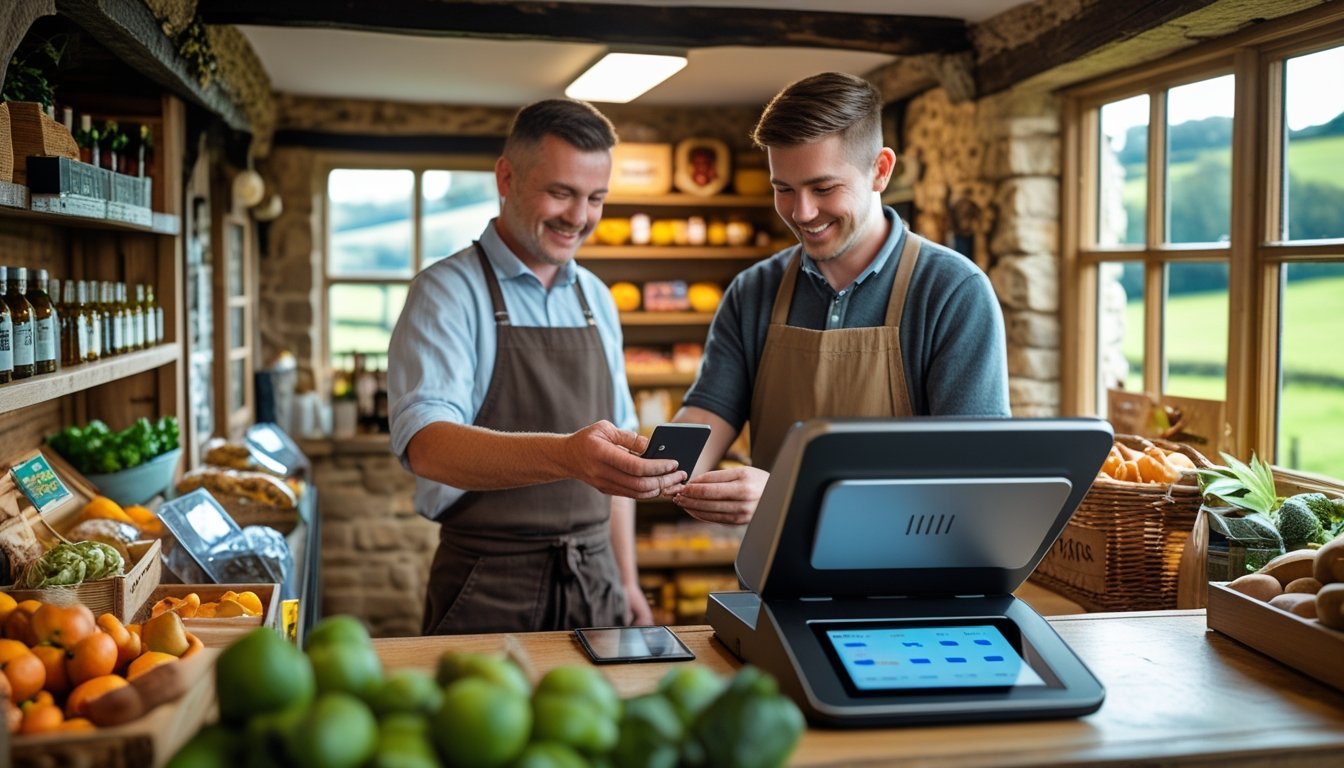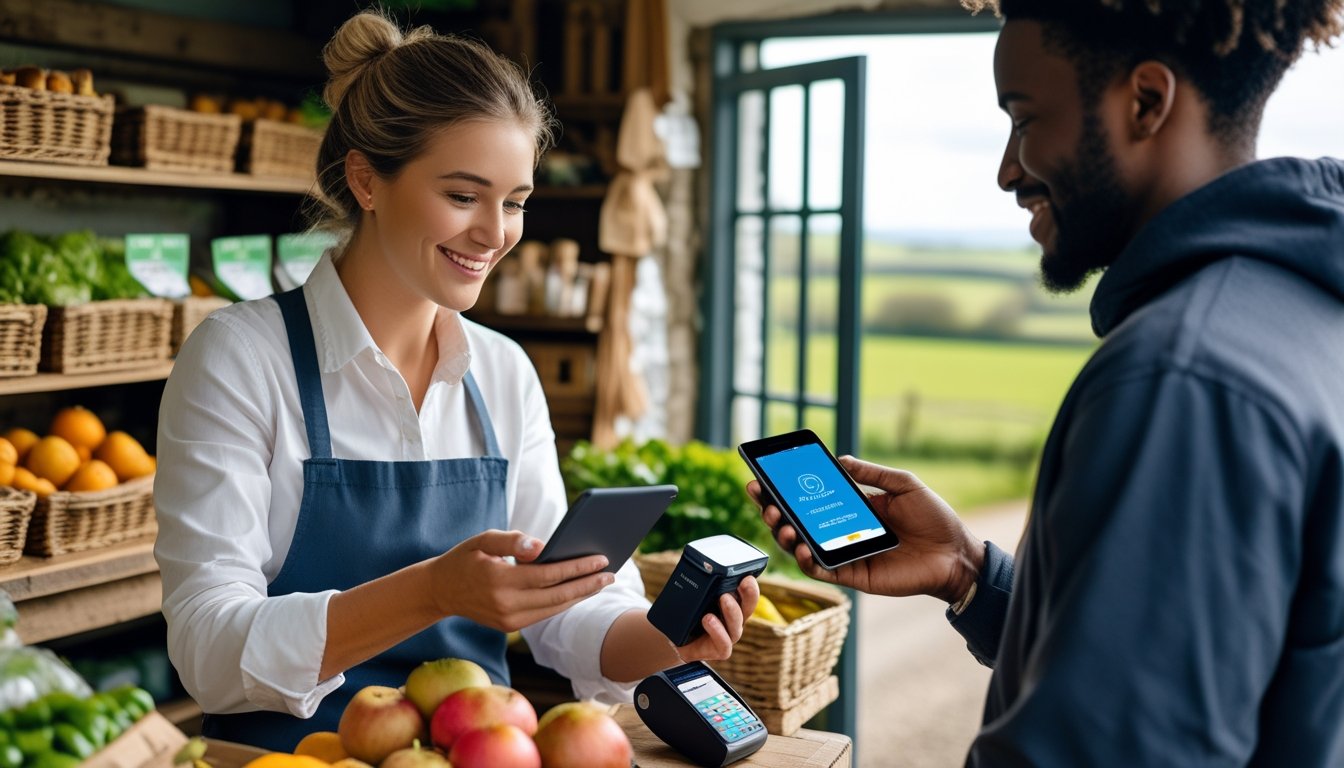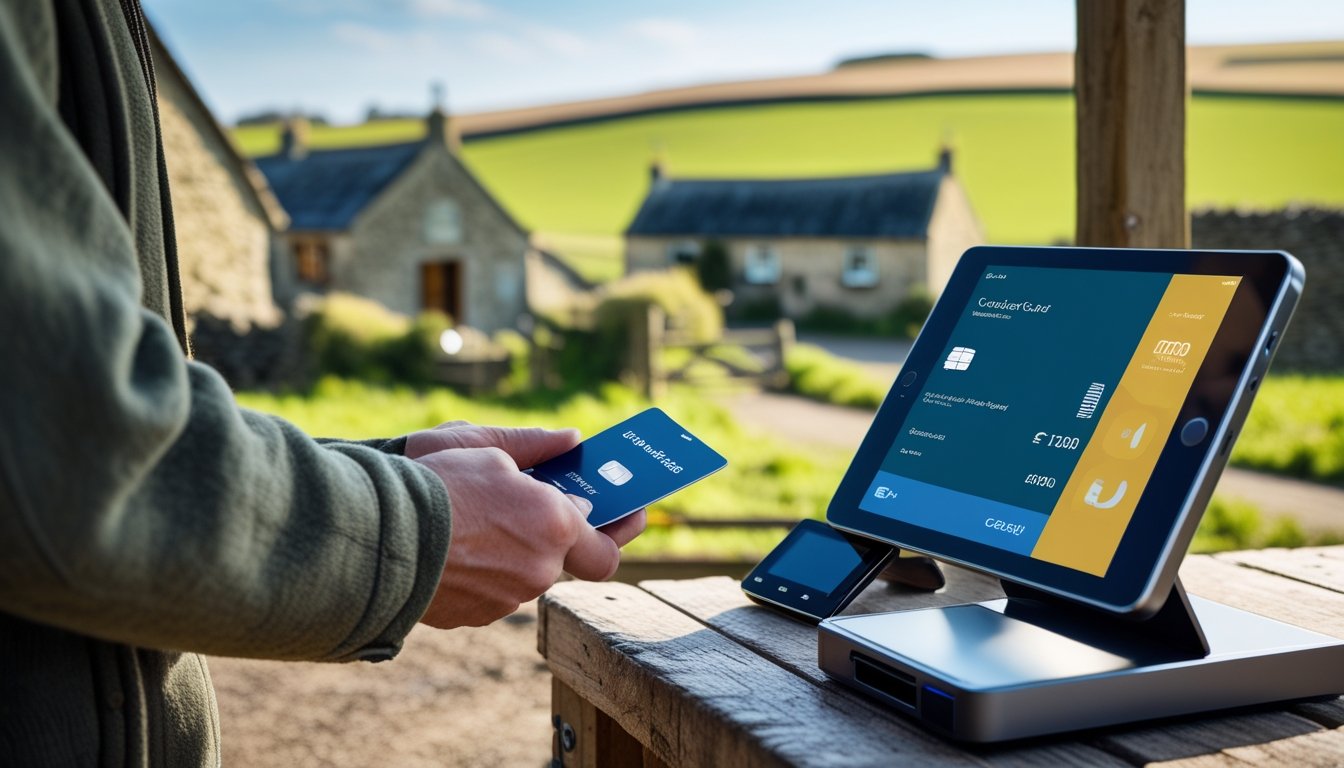Late updated: 16 May 2025 08:05
Written by: Oliver Bennett
Digital Payment Solutions For Rural UK Businesses: Enhancing Accessibility and Growth
In today's rapidly evolving digital landscape, facilitating efficient and seamless transactions is paramount, especially for rural businesses. As digital payments become the norm in many parts of the world, rural UK businesses must not be left behind. Adopting digital payment solutions can significantly enhance the operational efficiency and customer experience for rural enterprises.

Access to robust digital payment systems can help rural businesses overcome geographical limitations and expand their market reach, even extending beyond local boundaries. Whether it's leveraging mobile wallets or integrating with online platforms, these solutions offer versatility and convenience that traditional methods may lack.
As we explore the possibilities, it's crucial to consider how these digital options can be integrated with minimal disruption. The benefits extend beyond financial transactions—they enable rural enterprises to offer a wider array of services, facilitating growth and sustainability.
Key Takeaways
- Digital payments boost efficiency and customer experience for rural UK businesses.
- Access to versatile payment solutions helps businesses overcome geographic limitations.
- Integration of digital payments supports growth and sustainability of rural enterprises.
Digital Payment Solutions for Rural UK Businesses
Rural UK businesses face unique challenges and opportunities when adopting digital payment solutions. While connectivity and infrastructure can pose issues, the benefits of integrating these technologies are substantial, especially in driving financial inclusion and growth.
Understanding the Needs of Rural Communities
Rural communities often encounter specific obstacles related to digital payments. Many businesses depend on seasonal activities, making cash flow inconsistent. Reliable, flexible payment solutions are essential in these settings. Electronic payments can enhance efficiency and reduce the reliance on cash.
Additionally, the demographic composition in rural areas may skew towards older populations, who might be less familiar with digital technologies. Education and support are vital in encouraging these groups to embrace digital payments.
Types of Digital Payment Technologies
There are various digital payment options suitable for rural businesses. Mobile payments, leveraging widespread smartphone usage, are among the most accessible. Services like Apple Pay and Google Pay are increasingly used.
Contactless card payments have also grown, driven by the convenience they offer. Furthermore, solutions like GoCardless provide tailored services for recurring charges, which can benefit subscription-based models in rural settings.
Innovations such as wearable payment devices may also find their niche, offering more varied ways for transactions to be completed seamlessly.
Overcoming Connectivity and Infrastructure Barriers
A primary hurdle for rural businesses is often inconsistent internet connectivity. This can restrict access to many digital services. Investing in infrastructure improvements, including broadband initiatives, is critical.
Some digital payment solutions operate in offline modes, allowing transactions to be queued until connectivity is restored. This capability is crucial in ensuring continuous business operations despite connectivity issues.
Collaborations with local governments and telecom providers can help in expanding digital infrastructure, directly supporting community businesses.
Driving Financial Inclusion and Economic Growth
By adopting digital payment technologies, rural areas can enhance financial inclusion. Digital payments provide secure, traceable transaction records, facilitating credit access for small businesses. This is crucial in regions where traditional banking services may be sparse.
Moreover, digital payments can foster broader economic growth by widening market reach beyond local boundaries. By enabling online sales and services, rural businesses can attract customers from further afield, driving revenue and growth.
Community workshops and training sessions can help demystify digital payment technologies, ensuring more people are empowered to participate in the digital economy.
Implementing and Adapting Digital Payment Solutions

To ensure rural UK businesses thrive amidst the rising digitalisation of the economy, it's crucial to efficiently implement and adapt digital payment solutions. The integration involves developing relevant skills, addressing security concerns, balancing digital and cash services, and enlisting the support of financial institutions.
Skills Development and Digital Adoption
Digital adoption is essential for rural businesses to transition smoothly to modern payment methods. Training is crucial as it equips employees with skills in mobile banking and online sales. Programmes focusing on digital literacy help SMEs effectively leverage contactless payments and mobile apps. Embracing these technologies can significantly improve business banking operations and enhance mobility, ensuring long-term sustainability.
Security, Trust, and Changing Consumer Behaviour
As businesses shift to digital platforms, security becomes paramount. Trust in digital banking solutions hinges on robust security measures. By investing in secure mediums, such as encrypted online payments, rural businesses can protect against fraud, fostering consumer confidence. Additionally, understanding changing consumer behaviours driven by convenience and ease of use is key. This ensures that businesses provide seamless and secure online and mobile banking experiences.
Balancing Access to Cash and Digital Services
While digital services advance, maintaining access to cash is still vital for some consumers. It's important to balance these offerings to cater to diverse customer needs. Branch banking and mobile app services can coexist, providing comprehensive financial services. For businesses, this balance supports customer loyalty by offering flexible payment options. Clubs and societies, for example, can benefit from both digital payments and traditional cash systems.
Role of Financial Institutions and Business Banking
Financial institutions, like the Royal Bank of Scotland, play a pivotal role in this digital transformation. They offer tailored business banking solutions to foster digital growth in rural areas. These institutions provide tools such as Bankline for easy transaction management. Furthermore, investment in infrastructure supports SMEs in adopting digital payment systems, moving beyond traditional branch banking to comprehensive digital services. This ensures we are ready to meet the dynamic needs of both businesses and consumers.
Frequently Asked Questions

Exploring digital payment solutions can greatly help rural UK businesses streamline transactions and enhance efficiency. It's vital to understand which systems and tools are best suited for these unique environments.
What are the leading digital payment systems suitable for rural UK enterprises?
Rural businesses might find mobile-enabled systems like Square and SumUp particularly useful due to their ease of use and minimal setup requirements. These platforms offer flexibility and require just a smartphone or tablet to operate. Stripe and PayPal also provide robust solutions with online capabilities, which are essential for remote transactions.
How do rural UK businesses typically implement contactless payment solutions?
Contactless solutions are often implemented with portable card readers. Businesses can integrate these with mobile devices. Providers like iZettle or Revolut offer devices specifically designed for contactless payments, easing the transaction process. This setup is invaluable for market stalls and mobile vendors operating in rural settings.
Can you list the most accessible and user-friendly digital wallets for rural business owners?
Digital wallets such as Apple Pay, Google Pay, and Samsung Pay are commonly accessible and user-friendly, designed for simplicity. These allow transactions using smartphones, providing convenience for both sellers and customers. Each wallet offers security features to safeguard transactions, which is beneficial for business owners in less densely populated areas.
What are the key considerations for selecting a payment gateway for a rural UK business?
When selecting a payment gateway, consider factors like transaction fees, ease of integration, and customer support. For rural businesses, gateways should work seamlessly with varying internet speeds. Stripe and Worldpay are noteworthy for their versatile integration options and responsive customer service, making them strong candidates for rural enterprises.
In terms of security, which digital payment options are recommended for small businesses in rural areas?
For optimal security, PayPal and Stripe provide solid options. Both ensure encryption and compliance with global payment standards. Square is another favoured choice, offering fraud detection and secure connectivity. Ensuring data protection remains paramount, and these providers offer solutions tailored to small business needs.
How does the adoption of electronic payment systems benefit rural businesses in the UK?
The adoption of electronic payment systems provides numerous benefits, including improved cash flow and customer convenience. It expands market reach, allowing rural businesses to engage with customers nationwide or globally. Moreover, it simplifies record-keeping and has the potential to reduce transaction errors, supporting the business's overall operational efficiency.
